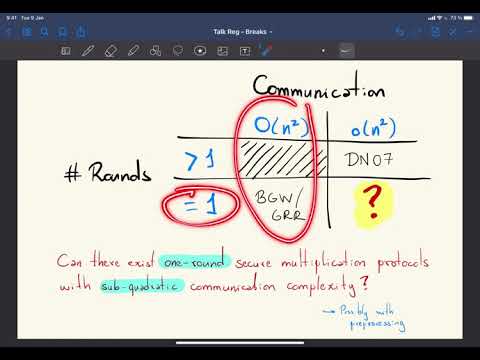CryptoDB
Improved single-round secure multiplication using regenerating codes
| Authors: |
|
|---|---|
| Download: | |
| Presentation: | Slides |
| Conference: | ASIACRYPT 2021 |
| Abstract: | In 2016, Guruswami and Wootters showed Shamir's secret-sharing scheme defined over an extension field has a regenerating property.
Namely, we can compress each share to an element of the base field by applying a linear form, such that the secret is determined by a linear combination of the compressed shares.
Immediately it seemed like an application to improve the complexity of unconditionally secure multiparty computation must be imminent; however, thus far, no result has been published.
We present the first application of regenerating codes to MPC, and show that its utility lies in reducing the number of rounds.
Concretely, we present a protocol that obliviously evaluates a depth- |
Video from ASIACRYPT 2021
BibTeX
@inproceedings{asiacrypt-2021-31433,
title={Improved single-round secure multiplication using regenerating codes},
publisher={Springer-Verlag},
doi={10.1007/978-3-030-92075-3_8},
author={Mark Abspoel and Ronald Cramer and Ivan Damgård and Daniel Escudero and Chaoping Xing},
year=2021
}

